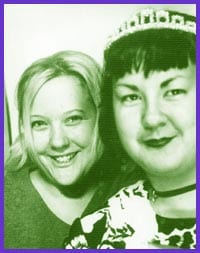This Dec 6 marks 10 years since the Montreal Massacre. Each year, women’s groups across Canada organize gatherings to remember 14 women killed.
One such event is Live Action Ladies, organized by Zoe Whittall as a benefit for the Toronto Rape Crisis Centre. “I’m from Montreal,” says Whittall, “so every year, it has always been something to organize around.”
Whittall has helped coordinate gatherings for a number of years in both Toronto and Montreal. For this event, she’s pulled together a line-up or Toronto women writers she’s met everywhere, from readings to clothes swapping parties.
Here’s what you’re likely to hear at Live Action Ladies. Whittall will read from “Della Can’t Die,” a story about the romanticization of mental illness and a woman who keeps trying to commit suicide unsuccessfully. Marnie Woodrow, author of In The Spice House, will give the first ever public reading of “King Cake,” a story about rape. Maxine Greaves plans to perform “I Wanna Get Banged,” a poem set to music “encouraging my lover to take the dildo out of the cupboard.”
Also performing are Debra Anderson, Lisa Foad, Buffy Bonanza, Mariko Tomaki, Camilla Gibb and others.
It’s difficult to tell if Live Action Ladies will have an activist atmosphere or whether it will be the kind of event that freezes the Montreal Massacre in time. (Raising awareness and money for the Rape Crisis Centre falls on the activist side.)
There’s some consensus among the writers I talked to that Dec 6 events must move beyond the 14 engineering students killed 10 years ago. As Woodrow puts it: “You have to make it mean something, now.” For her Live Action Ladies is “an occasion to read work that is fueled by violence against women… but women will probably read stuff that is celebratory as well, that’s about strength. Laughter is healing.”
But Woodrow also anticipates criticism. “It is suggested that the topic [violence against women] is the stuff of the angry young writer,” she says, “that it’s a phase, like people say about bisexuality.” Woodrow’s also noticed a change in the reception of Dec 6 events, from those who define themselves as postfeminists. “The term contains a nugget of shame,” she feels, conceding, however, “it’s good, if it liberates women.”
I have my own misgivings. My attendance at these kinds of events dropped when I began to feel that the commemorations did not acknowledge adequately that violence affects women from broad social realities – that they did not reflect the everyday violence endured by poor women and women of colour, for example.
When commemorations did go “broader” they went in the direction of humour, or into issues traditionally deemed women’s, such as eating disorders.
Out of the 13 scheduled writers at Live Actin Ladies, only two are women of colour.
When asked if racist or police violence will be discussed, Whittall says, “hopefully, [the event] will be a forum for all issues to come up in a creative way.”
My hope is that this and other Dec 6 events don’t fall into the trap of safe outrage and, instead, challenge us to form broad alliances that confront violence in all its forms today.
Live Action Ladies.
PWYC-$10. 8pm.
Mon, Dec 6.
Red Spot.
459 Church St.
(416) 967-7768.

 Why you can trust Xtra
Why you can trust Xtra


